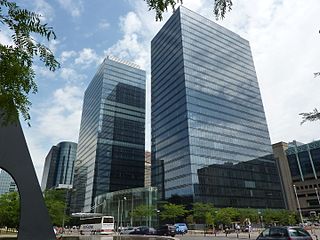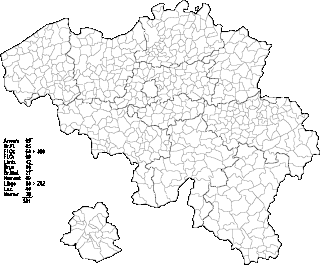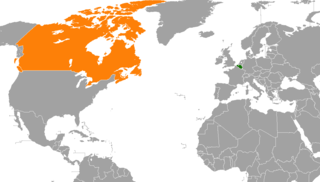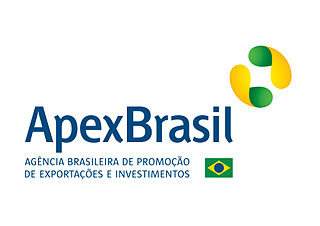Related Research Articles

Flanders is the Flemish-speaking northern portion of Belgium and one of the communities, regions and language areas of Belgium. However, there are several overlapping definitions, including ones related to culture, language, politics, and history, and sometimes involving neighbouring countries. The demonym associated with Flanders is Fleming, while the corresponding adjective is Flemish. The official capital of Flanders is the City of Brussels, although the Brussels-Capital Region has an independent regional government. The government of Flanders only oversees the community aspects of Flanders life in Brussels, such as Flemish culture and education.

The economy of Belgium is a modern, capitalist economy that has capitalised on the country's central geographic location, highly developed transport network, and diversified industrial and commercial base. Belgium was the first country to undergo an Industrial Revolution on the continent of Europe in the early 19th century. It has since developed an excellent transportation infrastructure of ports, canals, railways, and highways, in order to integrate its industry with that of its neighbours. Industry is concentrated mainly in the populous region of Flanders in the north, around Brussels and in the two biggest Walloon cities, Liège and Charleroi, along the sillon industriel. Belgium imports raw materials and semi-finished goods that are further processed and re-exported. Except for its coal, which is no longer economical to exploit, Belgium has few natural resources other than fertile soils. Nonetheless, most traditional industrial sectors are represented in the economy, including steel, textiles, refining, chemicals, food processing, pharmaceuticals, automobiles, electronics, and machinery fabrication. Despite the heavy industrial component, services account for 74.9% of GDP, while agriculture accounts for only 1% of GDP.

Belgium is a country in Europe and member of major international organizations like the European Union and NATO which are both headquartered in Brussels, Belgium.

Wallonia is one of the three regions of Belgium—along with Flanders and Brussels.

Belgium comprises 581 municipalities, 300 of them grouped into five provinces in Flanders and 262 others in five provinces in Wallonia, while the remaining 19 are in the Brussels Capital Region, which is not divided in provinces. In most cases, the municipalities are the smallest administrative subdivisions of Belgium, but in municipalities with more than 100,000 inhabitants, on the initiative of the local council, sub-municipal administrative entities with elected councils may be created. As such, only Antwerp, having over 500,000 inhabitants, became subdivided into nine districts. The Belgian arrondissements, an administrative level between province and municipality, or the lowest judicial level, are in English sometimes called districts as well.

The Office of the United States Trade Representative (USTR) is an agency of the United States federal government responsible for developing and promoting American trade policy. Part of the Executive Office of the President, it is headed by the U.S. Trade Representative, a Cabinet-level position that serves as the U.S. President's primary advisor, negotiator, and spokesperson on trade matters. USTR has more than two hundred employees, with offices in Geneva, Switzerland, and Brussels, Belgium.

The Flemish Parliament constitutes the legislative power in Flanders for matters which fall within the competence of Flanders, both as a geographic region and as a cultural community of Belgium.

Elections in Belgium are organised for legislative bodies only, and not for executive functions. Direct elections take place for the European Parliament, the Chamber of Representatives, the Parliaments of the Regions, the Parliaments of the Communities, the provincial councils, the municipal councils and the councils of Districts of Antwerp. Voting is mandatory and all elections use proportional representation which in general requires coalition governments.

Under the Basic Law, Macau's diplomatic relations and defence are the responsibility of the central government of China. Except diplomatic relations and defence, nonetheless, Macau has retained considerable autonomy in all aspects, including economic and commercial relations, customs control.

The Federal Public Service Foreign Affairs, Foreign Trade and Development Cooperation is the foreign affairs ministry of Belgium and is responsible for Belgian foreign policy, relations with the European Union, development cooperation policy and certain aspects of foreign trade policy. The central government in Brussels directs the network of diplomatic and consular representations abroad.

State reform, in the context of Belgium, is the ongoing process of seeking and finding constitutional and legal solutions to the problems and tensions in the different segments of the Belgian population, mostly between the Dutch-speakers of Flanders and the French-speakers of Wallonia. In general, Belgium has evolved from a unitary state to a federal state with communities, regions, and language areas.

Belgium–Canada relations are those between the nations of Belgium and Canada. Both are close allies and members of NATO and Francophonie. Both have a stance of multilateralism. The two nations have official bilingualism, and similar federal government systems owing in part to language tensions in both. Both were actively involved in the war in Afghanistan under ISAF.
Offsets can be defined as provisions to an import agreement, between an exporting foreign company, or possibly a government acting as intermediary, and an importing public entity. The incentive for the exporter results from the conditioning of the core transaction to the acceptance of the offset obligation. Offset agreements often involve trade in military goods and services and are alternatively called: industrial compensations, industrial cooperation, offsets, industrial and regional benefits, balances, juste retour or equilibrium, to define mechanisms more complex than counter-trade. Counter-trade can also be considered one of the many forms of defense offset, to compensate a purchasing country.

Belgium–Ukraine relations are foreign relations between Belgium and Ukraine. Diplomatic relations were established in 1992. Belgium has an embassy in Kyiv; Ukraine has an embassy in Brussels and two honorary consulates. Although politically the two nations are not closely connected, they have a long history of economic integration and trade, with Belgian investment playing a role in the contemporary Ukrainian economy.
The history of Wallonia, from prehistoric times to the present day, is that of a territory which, since 1970, has approximately coincided with the territory of Wallonia, a federated component of Belgium, which also includes the smaller German-speaking Community of Belgium. Wallonia is the name colloquially given to the Walloon Region. The French word Wallonie comes from the term Wallon, itself coming from Walh. Walh is a very old Germanic word used to refer to a speaker of Celtic or Latin.
Water supply and sanitation in Belgium is provided by a large variety of organizations: Most of the 581 municipalities of Belgium have delegated the responsibility for water supply and sanitation to regional or inter-municipal utilities. There are more than 62 water supply utilities, including 2 regional, 30 inter-municipal and 30 municipal utilities. Another 100 mostly small municipalities provide services directly without having a legally of financially separate entity for water supply. Water is not scarce in Belgium and water supply is generally continuous and of good quality. However, wastewater treatment has long lagged behind and Brussels only achieved full treatment of its wastewater in 2007. In 2004 the European Court of Justice ruled condemning Belgium's failure to comply with the EU wastewater directive, and the ruling has not been fully complied with so far. Wallonia satisfies 55% of the national needs in drinking water while it counts only 37% of the population. Flanders and Brussels are dependent on drinking water from Wallonia, at a level of 40% and 98% respectively.
The Walloon Export and Foreign Investment Agency is a public interest organisation in charge of the promotion of foreign trade and the attraction of foreign investments for Wallonia in Belgium. It was created on 1 April 2004 as a merger of the Walloon Export Agency (AWEX) and the Office for foreign Investors (OFI).
The Trade Delegation (Representation) of the Russian Federation in the United Kingdom of Great Britain and Northern Ireland is a state institution ensuring foreign economic interests of the Russian Federation in the United Kingdom. It is an integral part of the Diplomatic Mission of the Russian Federation in the UK. The Delegation acts under political guidance of the Ambassador of the Russian Federation in the United Kingdom. General governance of its activities is carried out by the Ministry of Economic Development of the Russian Federation. The Trade Delegation was established on 24 February 1920. It was the first Russian trade representation abroad and it began the history of trade representations of Russia in foreign countries. By now the word “Delegation” still appears in the official English name for the Russian Trade Representative’s Office to the UK. The Trade Delegation is headed by the Trade Representative who is appointed by the Government of the Russian Federation upon recommendation by the Ministry of Economic Development agreed with the Ministry of Foreign Affairs of the Russian Federation.

The Brazilian Trade and Investment Promotion Agency, or ApexBrasil is both the trade promotion organisation (TPO) and the investment promotion agency (IPA) of Brazil. Founded in 1997 as a subsidiary of the micro and small business support organisation SEBRAE, ApexBrasil became in 2003 an autonomous non-profit entity funded by the private sector and supervised by the Federal Government of Brazil. Formally linked to the Foreign Ministry since 2016, it promotes Brazilian products and services abroad, attracts foreign direct investment and supports national companies, especially small and medium-sized, on their international journey. Through its programmes and services, ApexBrasil supports approximately one third of Brazil's annual exports and contributes to facilitate at least one fourth of its foreign direct investment (FDI) inward flows each year. More than 15 thousand Brazilian companies are directly supported by the agency, virtually all of them micro, small or medium-sized.